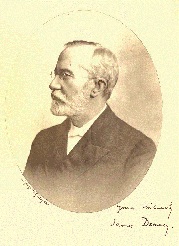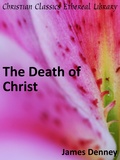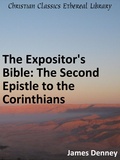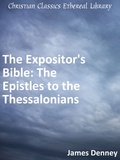James Denney
Scottish Free Church theologian
Biography
Born in Paisley, Scotland, James Denney was reared a "Cameronian" or strict Reformed Presbyterian. His father was a deacon in the church, and all the fervor of Presbyterianism's long fight for freedom flowed through his veins. It is not surprising that, when further disruptions rocked the denomination, John Denney and his family withdrew and, with a large group of loyal independents, joined the Free Church of Scotland. Such zeal and commitment to what was believed to be the truth were passed on to his son James.
Following his graduation from the local academy, James Denney enrolled in the University of Glasgow (1874) where he distinguished himself in both classical literature and philosophy. He graduated with honors and a Master of Arts degree in 1879 and immediately entered the Free Church College, Glasgow, where he had the good fortune to study under Robert S. Candlish, A. B. Bruce, and T. M. Lindsay. In 1883 he graduated with a Bachelor of Divinity degree. Denney' only pastorate was at Broughty Ferry (1886-1897), where he took his young bride, the former Mary Brown. Their life together was one of happy companionship, and when she died in 1907 without bearing any children, James Denney found nothing to replace his keen sense of loss. Mary Denney contributed much to her husband's ministry. He was inclined to be authoritarian, and under her kindly encouragement he became more compassionate. In addition, James Denney was disposed by his training to be theologically liberal and through her tender influence he became more evangelical. In fact, it was due to her recommendations that he began reading the writings of Charles Haddon Spurgeon, and the evangelical fervor of this British Baptist preacher radically changed the young Scot's ministry. One biographer records Denney saying, "Though it is my business to teach, the one thing I covet is to be able to do the work of an evangelist, and that at all events is the work that needs to be done."
With stress upon expository preaching characterizing his ministry at Broughty Ferry, Denney was invited to contribute two commentaries to The Expositor's Bible: “The Epistle to the Thessalonians" (1892) and "The Second Epistle to the Corinthians" (1894).
In 1894, James Denney was invited to deliver a series of lectures in theology at the Chicago Theological Seminary. Before leaving for the United States, the University of Glasgow honored Denney with a Doctor of Divinity degree. On his return to Scotland, Denney was soon called upon to succeed Dr. Robert S. Candlish as Professor of Systematic and Practical Theology in the Free Church College. Two years later, on the passing of Dr. A. B. Bruce, he was appointed to the chair of New Testament Language Literature, and Theology. Later, in 1915, he was invited to become principal of the college, succeeding Dr. T. M. Lindsay.
His premature death brought his illustrious career to an untimely end. While Professor Denney was at home expounding the text of a given book of the Bible, and was also a capable exegete (in 1900 he contributed a work on "The Epistle to the Romans" to The Expositor's Greek Testament), his greatest contribution was made as a theologian. In this respect, his Death of Christ (1902) may be regarded as his magnum opus.



